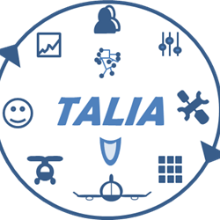Researching the foundations for a more efficient and safer development process within avionics system development over the course of four years - that was our goal within the BMWK-funded aviation research project TALIA. The project was carried out in collaboration with Diehl Aerospace, Airbus, DLR, NordMicro and the Institute of Aircraft Systems Technology at Hamburg University of Technology (FST). The final project meeting took place at Diehl Aerospace in Überlingen at the beginning of September. The respective results of the project partners were presented to the project sponsor DLR.
The aim of the ILS team - Bastian Lüttig, Andreas Waldvogel, Constantin Frey, Vanessa Tietz and Björn Annighöfer - was to optimize the development process of avionics systems through (1) the reduction of configuration parameters and (2) a user-friendly, efficient and safe model-based development environment.
Topic (1) was researched in the ADIMA sub-project: Peripherals (LEDs) are to be automatically recognized and configured by IMA (Integrated Modular Avionics) modules with the help of neural networks. This was achieved with a feed-forward neural network and an auto-encoder.
Topic (2) is based on the development of the qualifiable meta-modeling framework DOMAINES (Domain-specific Modeling for Aircraft and other Environments). This should make it possible to digitally represent and safely configure systems within so-called user models efficiently and safely on the basis of a domain-specific modeling language, i.e. a construction plan specific to avionics, with the help of abstract representations.
At the final project meeting, live demonstrations were used to show that both approaches have the potential to solve typical problems in avionics system development.
The project sponsor was visibly impressed by our results and their presentation in clear and comprehensible live demonstrations and would be pleased to see a continuation of the work carried out. The entire project network received high praise for its good results and successful collaboration. The ILS would like to thank its project partners for the excellent cooperation over the past 4 years.




